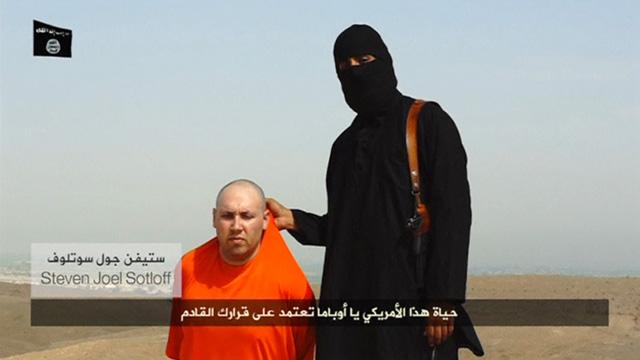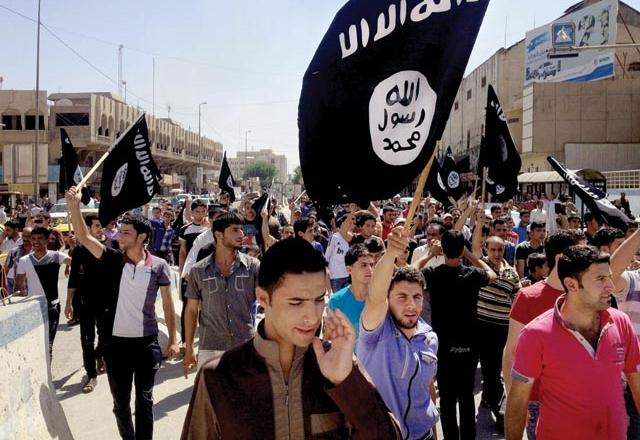You are here
British Muslims blame jihadi subculture after beheading video
By Reuters - Aug 21,2014 - Last updated at Aug 21,2014

LONDON/BAGHDAD — A British Muslim leader called on Thursday for action to tackle a jihadi sub-culture after an Islamic State video showed a suspected Briton beheading US journalist James Foley held hostage in Syria.
In Washington, Attorney General Eric Holder said the US Justice Department had opened a criminal investigation into the death of Foley on the video, which featured a masked man speaking English with a British accent.
As Western officials tried to identify the man, the Muslim Council of Britain denounced Foley's "abhorrent murder" and one of its advisers urged anyone who knows who the killer is to contact the police.
Horror at the video spanned from the West to Baghdad, where Iraqis asked why the United States and its allies had not cracked down on Islamic State fighters long before they captured large areas of Syria and Iraq.
Foley, 40, was beheaded by an Islamic State militant in the video that surfaced on the Internet on Tuesday, and officials in Washington revealed that US special forces had tried unsuccessfully to rescue him along with other American hostages earlier this summer.
A firefight between the US forces and Islamic State militants during the rescue attempt appeared to be the first direct ground engagement between the two sides.
The video caused particular shock in Britain, which is home to about 2.7 million Muslims, although the hundreds of British men fighting with the militants in Iraq and Syria have created concern for some time.
Iqbal Sacranie, an adviser to the Muslim Council of Britain, said Britons from across the country's communities had to stop young men being seduced by radical ideologies.
"This subculture of this 'jihadi-cool' — as they call it in the media — within the margins of society ..., that is the real challenge," he told BBC Radio. "This is a problem that affects all of us and it will only be dealt with more effectively if all of us are working together on this."
Sacranie said the Muslim community was pushing the message that "this is totally alien to Islam" and families were reporting to the authorities when they discovered their sons had headed to the Middle East to fight. He also told London's Evening Standard newspaper that anyone who recognised the man in the video had a duty to contact police.
John, Paul and Ringo
The Guardian newspaper said a former hostage had identified the masked man as the leader of three Britons who guarded foreign hostages in the city of Raqqa — Islamic State's stronghold in eastern Syria.
The BBC also reported that hostages had given their three captors nicknames after members of the Beatles pop group — John, Paul and Ringo.
Ghaffar Hussain, managing director of the counter-extremism Quilliam Foundation, said it was almost inevitable that men who had fought in Syria would return to plan attacks in Europe.
"It is disturbing that people born and raised in Britain and who have gone to the same schools as us could have been essentially indoctrinated to the extent where they can justify raping women and chopping heads off," he said.
Four British Islamists — two of whom had been to Al Qaeda training camps in Pakistan — killed 52 people in suicide bomb attacks on London in July 2005, and Britons have appeared in graphic Islamist videos before.
Until recently, Islamic State concentrated on establishing its self-proclaimed caliphate in areas of Syria and Iraq it has seized rather than on attacking the West like Al Qaeda — the group from which it split.
But US President Barack Obama's decision to order air strikes on its fighters in Iraq appears to have changed this. The video also showed images of another US journalist, Steven Sotloff, whose fate the group said depends on how the United States acts in Iraq. "The life of this American citizen, Obama, depends on your next decision," the masked man says.
In Baghdad, Iraqis expressed their horror at the video but questioned Western strategy on Islamic State, which advanced out of Syria in June to capture several major Iraqi cities including Mosul before the United States intervened militarily.
"The killing is the crime of all crimes, whoever the victim is," said Kareem Jamal, 55, an Arabic language teacher at a secondary school.
"I wish the world superpowers had fought these criminal groups in their incubators. The US should have hit Islamic State when they first appeared in Syria. Why didn't they hit them when they first entered Mosul and other cities?"
Ali Mohammed Saeed, a 35-year-old doctor, called for deeper Western involvement, almost three years after US troops pulled out of Iraq. "Air strikes are not enough, those criminals need ground troops to kill them and kick them out."
British Prime Minister David Cameron has ruled out sending troops to step up Britain's military involvement in Iraq, which has so far been focused on delivering supplies to Kurdish forces fighting Islamic State and using jets to conduct surveillance.
Related Articles
President Barack Obama vowed Wednesday that the United States would not be intimidated by the beheading of a second American reporter but acknowledged the fight against the jihadists would take time.
Britain's top counter-terrorism police officer said on Tuesday arrests linked to fighting in Syria had risen dramatically this year and that significant progress was being made to trace a British man suspected of murdering American journalist James Foley.
WASHINGTON — The US military said Friday it was "reasonably certain" that the Daesh executioner "Jihadi John" was killed in a drone strike i












